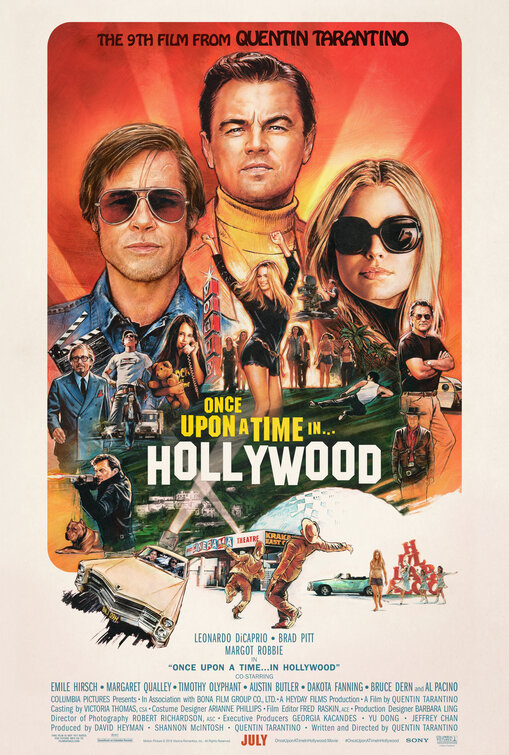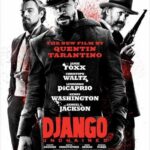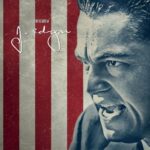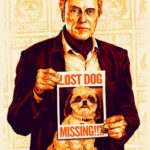The 9th Film From Quentin Tarantino
Director
Quentin Tarantino
Starring
Leonardo DiCaprio
Brad Pitt
Margot Robbie
Set in late 1960s Hollywood, the film follows Rick Dalton [DiCaprio] as he tries to salvage a once high-studded career with TV guest appearances but never getting the grace he feels he deserves. With him as his dogsbody is stuntman Cliff Booth [Pitt] whose calm demeanour and simple living conditions seem to compliment Dalton’s highly strung need for approval and success. Around the time of this slump, Roman Polanski and his new wife Sharon Tate [Robbie] move in next door and for a period of time we follow Tate as she enjoys LA life. Lurking in the periphery is a group of transient young women who all live out on an old film ranch with an enigmatic man named Charlie.
At its heart, Once Upon A Time In Hollywood feels like an attempt at a more focused, mature story from a director who has had great fun playing with a toy box of artistic talent but now wants to create something of grounded merit. However, without as many signature directorial flourishes and a very lethargic story, the final result is one that closes disappointingly. From the fairly disjointed opening vignettes, quickly darting through flashbacks to points of Dalton’s career, to the lack of closure with most of Booth’s subplots, the entire experience is left slow and languid due to lack of real fluidity. On top of that, the script suffers from some unfortunately overt and frankly lazy writing. Tarantino has always been gifted with dialogue and natural-feeling discourse but too often the dialogue devolves into uncharacteristically blunt signposting. As an example, in one of the film’s most enjoyable and immersive scenes, Dalton is on the set of a TV pilot, reading a pulpy western novel while his precocious young co-star is working on her character. In this scene, the actress asks what the book is about and Dalton explains that it centres on the adventures of a semi-over-the-hill bronco named Easy Breezy. As he describes the character questioning whether his better years are behind him, he starts to break down in a moment of fragility. The actress comforts him before he snidely pushes her away. This should be a subtle insightful moment but it lacks nuance and beats the audience around the head with the parallel between Dalton and the subject of his story. Then you have the Bruce Lee scene, which wasted a great imitator performance and is a classic example of unimaginatively pitting your fictional creation against a recognisable or established individual to cement their supposed abilities. It’s seemingly not enough to illustrate through circumstance that Booth is a wholly capable performer, he has to pummel someone who the audience know would have been extremely difficult to best in fight. And in the most backhanded of compliments, that is genuinely beneath Tarantino.
At this stage in his career Tarantino is in an interesting place, his films are commercial and critical successes (even his missteps have merit) and that’s largely due to the incredibly talented individuals he surrounds himself with. Subsequently, it’s hard not to compliment great swaths of this movie. Case in point, the production design and period recreation are exceptional with the cars, locations, costumes, hair and makeup perfectly evoking the desired time period. This also extends to the cast and their honestly hypnotic performances. For a great deal of the runtime it can often feel like nothing is happening – especially as a brief synopsis of the film could boil down to, actor films a pilot, stuntman picks up a hitchhiker and actress gets a book then watches a film on the way home – but calibre of acting involved means that these small moments are the most memorable and moving; for example, Tate decides, on a whim, to watch her own film in secret, enjoying the audience’s positive reaction and feeling pride that she has done well without jumping up and soaking up any praise or limelight. But with all these fantastic components, the film ultimately stumbles and falters with the denouement primarily because the story-proper is barely tangible and the only people who really care about Hollywood stories are Hollywood.
**the end of the movie is discussed in this paragraph.. so.. spoilers**
In truth, Once Upon A Time In Hollywood strives to capture something but never quite does. The entire film circles, without ever fully focusing on, the Manson Family, before bringing it into the foreground at the end of the film. At this point, Tarantino departs from the genuinely gruesome history and creates his third revenge fantasy. This created a problem for me that had a retroactive reflective effect. Creating an alternate series of events surrounding the Tate murders left a strangely bad taste in the mouth and didn’t strike me as cathartic or an act of celebratory retribution, just an exercise of poor taste. But while this writing tool or gimmick, if you will, was incredibly effective in Inglourious Basterds but had diminishing returns in Django Unchained, it finally outstayed its welcome here; which is where I had a bit of an analytical crisis. I praised the Hitler’s face being peppered with bullet holes while a giant face cackles, “this is the face of Jewish vengeance” and understood the satisfaction that comes from seeing a freed slave walking through a house of cruel plantation owners, mercilessly blowing them away with the effect of a canon but this was different. This felt less like a fantasy correction of a huge endemic case of genocide or mass-slavery, it was a single, personal event. But surely that’s just as appalling as these aforementioned cases. Am I just unhappy with its use here because I’m bored of the gimmick? I would like to think that isn’t the case but either way, I think the key difference is the characters and stories were so centrally focused on this entire issue and the audience could work up to where the events were headed but with this feature, the Manson Family are quite peripheral and incidental. I can understand that might have been the desired effect to show how the events in question came out of nowhere but as stated, it strives for something but never quite attains it.
The real frustration is if this film was in the hands of any other director or acting team, it would be lambasted for being a bloated, pretentious, meandering celebration of a bygone era of male-oriented stardom at everyone else’s expense. But owing to the individuals involved, it will likely be hailed as a glorious love letter to a “better time” that never really was.
Release Date:
23 August 2019
The Scene To Look Out For:
As stated, there are some truly gripping and fantastic vignettes throughout. One of which is Cliff Booth surveying the ranch he use to work on and approaching the owner’s house. Booth can handle himself as a war hero so we know any negative outcome is unlikely but the levels of tension as the entire community stop and watch him walk up to the lonely shack is fantastic. What’s more, it made me realise how much I would like to see Tarantino do straight horror – even something akin to Rob Zombie’s work if he wants to retain his schlocky grindhouse feel – affording him the opportunity to make something truly interesting.
Notable Characters:
DiCaprio is without a doubt a standout performer. He is an actor who has been giving commanding roles for over two decades and brings so much depth and dedication to every single character he embodies. Rick Dalton is no different and the levels of complexity and immersion are fantastic, from the outward projection of his “acting” to the character he is in private, to the extremely fragile broken man he allows himself to briefly be around close confidents. It’s an authentically brilliant all-round performance that unfortunately belongs in a superior release.
Highlighted Quote:
“My idea is we kill the people who taught us how to kill”
In A Few Words:
“A wholly self-indulgent commemoration of cinema from yesteryear but one that fails to actually say much of anything”
Total Score: 2/5

![The Red Right Hand Movie Reviews [Matthew Stogdon]](https://reviews.theredrighthand.co.uk/wp-content/uploads/2021/12/cropped-header1.png)



